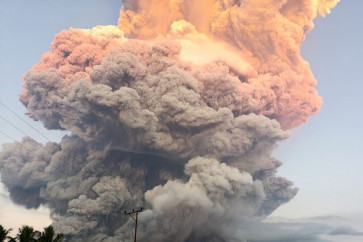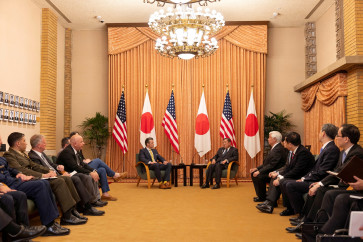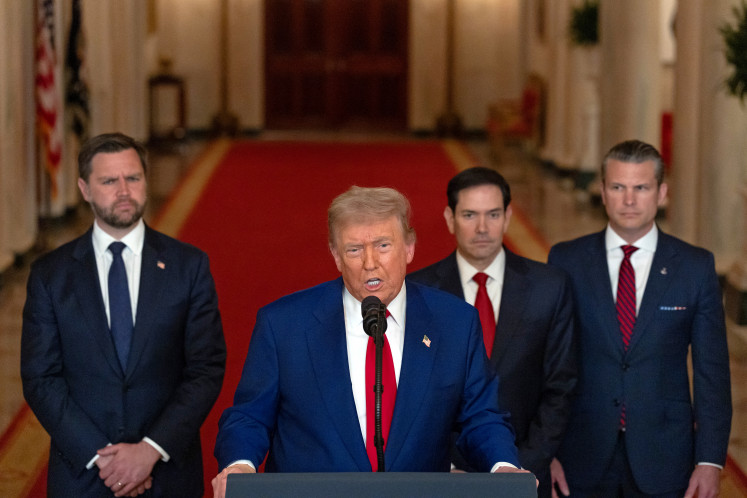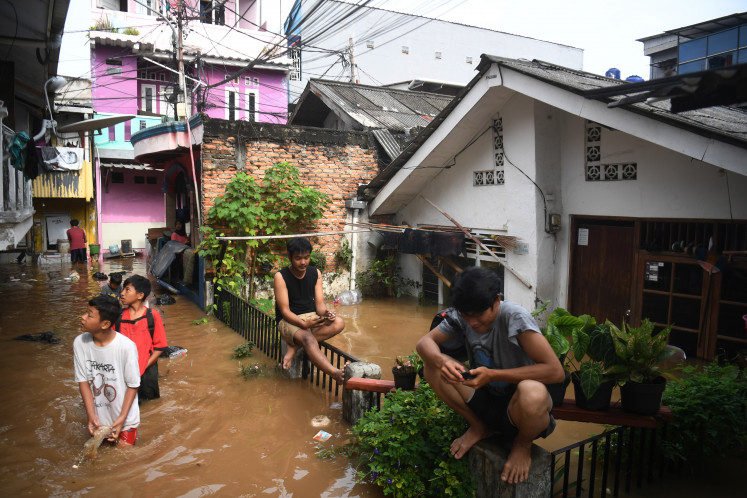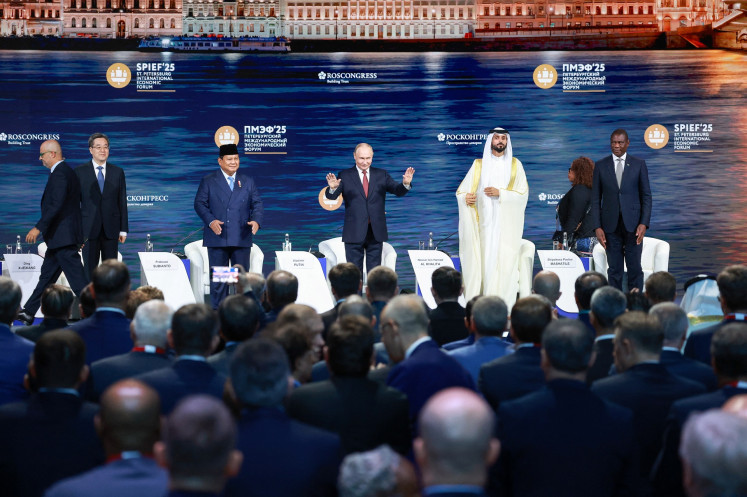Popular Reads
Top Results
Can't find what you're looking for?
View all search resultsPopular Reads
Top Results
Can't find what you're looking for?
View all search resultsU-20 bust shows Jokowi has a rocky road ahead
The clash between the President and his Indonesian Democratic Party of Struggle (PDI-P) over Israeli participation in the 2023 FIFA U-20 World Cup is only the latest of many signs of the ongoing power reconfiguration, or oligarchic realignment, within his coalition.
Change text size
Gift Premium Articles
to Anyone
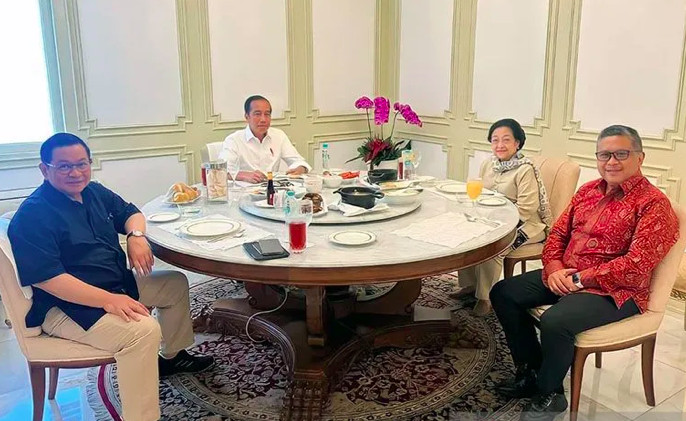
T
he power bloc that props up the Joko “Jokowi” Widodo administration has always been fractured, consisting of different, if conflicting, social, political and business interests. It is not unusual for the ruling elites to clash over critical state policies. Flip-flops and U-turns have been a feature, rather than a bug, of the current government.
But never has the ruling coalition been this dangerously fractious. While the President has managed to consolidate his power by keeping at least nine political parties, two major Islamic groups and several powerful oligarchs on his side, he may now be starting to lose the political capital to keep members of his ruling coalition in check.
This could be the beginning of the end for Jokowi’s political leadership. With the proposal to extend his term going nowhere, and his time to vacate the State Palace drawing closer each day, Jokowi’s coalition is now wobbling on shaky ground.
The clash between the President and his Indonesian Democratic Party of Struggle (PDI-P) over Israeli participation in the 2023 FIFA U-20 World Cup, which led to Indonesia’s shocking removal as host of the global soccer event, is only the latest of many signs of the ongoing power reconfiguration, or oligarchic realignment, within his coalition. It is a symptom of a deepening division among his strongest supporters that could severely undermine his leadership in the last two years of his presidency.
Paloh vs. Megawati
The first sign of fracturing within the ruling bloc would be the NasDem Party’s decision to nominate former Jakarta governor Anies Baswedan as Jokowi’s successor.
Jokowi and other coalition members have long considered Anies the poster boy of anti-government forces. That NasDem leader Surya Paloh is working with the opposition parties, the Democratic Party and the Prosperous Justice Party (PKS), to sell Anies as “Jokowi’s successor” may sound absurd. But it makes sense politically, given the troubled relationship between Paloh and PDI-P matriarch Megawati Soekarnoputri.
Paloh’s turn to Anies is not a rebuke against Jokowi, but a calculated move to reshape the political configuration after 2024. It is no surprise that the word “unity” was added to the name of his coalition with the opposition parties. It is no longer the Coalition for Change per se, but the Coalition for Change and Unity.
In a clear attempt to portray Anies as a “unifying” presidential candidate, the media mogul recently invited Golkar Party leader Airlangga Hartarto for an iftar gathering at NasDem’s headquarters, in which Jusuf Kalla, a long supporter of Anies and a former Golkar chairman, encouraged Jokowi’s senior minister to their alliance.
Golkar leads the United Indonesia Coalition (KIB) with the National Mandate Party (PAN) and the United Development Party (PPP). The alliance, which has yet to name its presidential candidate, is widely seen as representing the most ardent supporters of the President in the legislative body, including the proposal to extend his term. If Golkar joins NasDem, the political map will drastically change in favor of Anies.
That the President has yet to remove NasDem politicians from the Cabinet despite pressures from the PDI-P shows that the party’s gambit with Anies is not all a bust yet.
PDI-P’s power move
The other sign of fracturing would be the question of Ganjar Pranowo, the clear frontrunner in the next presidential election.
The President has put pressure on the PDI-P to endorse the Central Java governor as the party’s presidential candidate, but Megawati has been dragging her feet to do just that. Certainly, as the country’s largest party, the PDI-P is a political force to be reckoned with. Golkar will have to think twice before officially nominating a PDI-P cadre, while Ganjar, in turn, will not risk his chances by accepting the nomination from other parties, given that the PDI-P still controls Central Java, where his stronger voter base is.
It is safe to say that the PDI-P, or Megawati, alone could decide whether or not Ganjar could be on the ballot next year. The party thus has the final say in deciding the terms for his nomination, something that Ganjar and Jokowi must follow at all costs.
This explains why Ganjar suddenly called for the exclusion of Israel from the U-20 event, though such a move was so out of character for him, and certainly a turn-off for many of his progressive, soccer-crazy, supporters, barring Israel from the tournament is an official party line that he must back to keep his nomination chances alive.
In other words, the U-20 bust is the collateral damage, if not a sacrificial lamb that Ganjar has to kill, in the power struggle over his candidacy.
No matter how you see the fiasco, the PDI-P was sending a clear message to its coalition frenemies that it is the largest political party with the strongest presidential contender that is set to dominate the 2024 polls.
Rocky road ahead
Jokowi, who is a PDI-P member, chose to break ranks with his party. The U-20 was supposed to be one of his biggest legacies, and he would not have wanted to taint his national and global reputation by having FIFA revoke Indonesia’s hosting of it at the eleventh hour. Moreover, according to Tourism and Creative Economy Minister Sandiaga Uno, FIFA’s decision has cost Indonesia Rp 3.7 trillion (US$369.6 million), citing the amount of funds the nation has already spent to renovate soccer stadiums and the loss of a potential tourism boom that could have been generated by the global soccer event.
Jokowi has no choice but to have a major Cabinet shake-up to ensure that members of his ruling coalition are solid enough to work effectively in his favor. The U-20 bust is certainly one of the biggest blows to his administration throughout his presidency, and it is clearly the result of an intra-elite conflict within his coalition ahead of 2024.
The President may have a huge stake in the next elections, considering many of his flagship programs are still in their early stages and whose continuity is contingent on the result of the 2024 presidential race. It is only natural for the President to hedge against any political risks by refraining from alienating any sides.
But he should be aware by now that his ruling coalition has never been more fractious, and this could spell troubles for the remainder of his presidency.
***
The writer is an editor at large of The Jakarta Post and a PhD student at the University of Melbourne’s Asia Institute.


